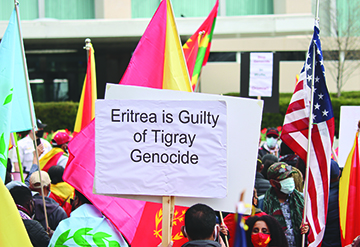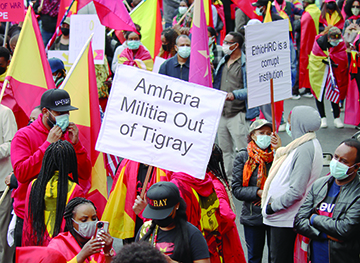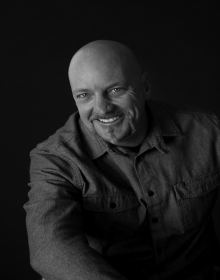“The world is divided into armed camps ready to commit genocide just because we can’t agree on whose fairy tales to believe.” — Ed Krebs
Daniel Woldu is a resident of Aurora, Colo., and a member of the international Tigray community. He has family members living in the Tigray region of northern Ethiopia. He watches in horror as online CNN footage (leaked from a soldier-turned-whistleblower) shows a military squadron slaughtering his ethnic peers in illegal extrajudicial executions. He is witnessing the genocide of his people — which is concurrently taking place.
Woldu is becoming increasingly distressed, as a member of his immediate family traveled to the Tigray region in early September. The region has since been invaded by its own country’s army — an initiative ordered by Ethiopian Prime Minister Abiy Ahmed. As a result, all communication was completely disabled. Although some telephone service has recently been restored, Woldu endures long stretches of worry — not knowing the fate or whereabouts of his gravely endangered family member. (Identity withheld at Mr. Woldu’s request). Speaking for his Tigray community at large, Woldu explains, “This is something the majority of our community members are facing. They have family members who are stranded and it’s hard to know their whereabouts or even if they are still alive or not.”
The Walls Close In
On November 4, 2020, while the rest of the world was fixated on the results of the U.S. election, the invasion of Tigray went largely unnoticed. The initiative began by blocking the main conduit of goods, services and commerce into the region and by cutting off all telephone and internet connections and shutting down the electrical grid. The Ethiopian National Defense Forces were then deployed along with aerial bombardments. Abiy declared the campaign was a “law and order” operation against domestic terrorists. Yet, the atrocities being committed by Abiy’s forces — which reports confirm as weaponized rape and indiscriminate murder — did not come to light until they were brought to the fore by Amnesty International. To make matters worse, the campaign has been joined by troops from the northern neighboring country of Eritrea, who are acting in allegiance with Abiy’s federal troops. To further complicate matters, Tigray is in an ongoing retributive dispute with militias from the western bordering region of Amhara, who are attempting to annex Tigrayan territories. Essentially, Tigray is surrounded on all sides.
Ulterior Motives

Ethiopian Americans of Denver show their support for their families in Tigray. Photo by Endale Getahun
Although Abiy’s campaign was presented to the global community as a peacekeeping necessity, it is largely recognized that the invasion was a result of long-simmering tensions between Ethiopia’s federal government and the regional government of Tigray. While the conflict is taking place on the other side of the globe, it is having a profound effect on many stateside communities. One such community is the Ethiopian populace of the Denver/Aurora region which includes around 30,000 residents — some foreign born and others first-generation Americans. A small segment of this community identifies as Tigrayan, which is ethnically distinct from other Ethiopian communities. This dynamic makes matters worse for people like Daniel Woldu, as long-held tensions between ethnicities driven by religious differences and cultural bias are being reignited by the conflict in Ethiopia and carried out in American communities. Woldu explains. “Abiy’s propaganda is so that the general population does not feel bad for being complicit with genocide.”
To The Streets
For this reason, members of the Tigray community in Colorado and in cities across the nation have taken to staging protests. Their mission is to spread awareness of the humanitarian crisis and to put pressure on American authorities to take action and stop the ongoing genocide of their people. Peaceful protests are taking pace in Washington, D.C., Denver, Los Angeles, New York City, Louisville, Las Vegas, and many others. Multiple marches on Colorado’s State Capitol as well as candlelight vigils at area religious centers are bringing the local Tigray community together, but so far, they have not swayed local officials to appeal to their counterparts in Washington to intervene. The overarching concern of the citizens is that Ethiopian federal troops are not allowing the United Nations into the region to provide humanitarian support to refugees, many of whom they are related to. While this is having some influence, activists like Daniel Woldu are painfully aware that it is not enough. “While they [U.S. Government] have put demands out there,” he says, “they have not been able to stop the [Ethiopian] military.”
To The Airwaves
Among members of the Denver/Aurora Ethiopian community, journalist Endale Getahun is working overtime reporting the events in Tigray as well as the ongoing protests in communities across the United States. Getahun broadcasts via Ethiopian Community Television and radio station KETO 93.9 FM. He explains that not all stateside Ethiopians are sympathetic to Tigray. “The majority of Ethiopians do not have sympathy for Tigrayans due to predisposed bias,” he says. Getahun also makes a clear distinction between Abiy’s propaganda, his claimed intentions and the subsequent actions of his military campaign. “When the government of Ethiopia launched the attack — to convince the general population — they said Tigrayan insurgents had attacked the military base in Tigray where the federal troops were stationed. But those troops have been there for 20-plus years — some of them are married to Tigrayans — so that was just an excuse.” He explains. “And now, since the power, communications and internet have been down, a lot of loved ones, a lot of people around the world, cannot reach their families, send money, food or medicine. Instead of apprehending the local [Tigrayan] leadership like they said they were going to do, they are trying to wipe out the whole Tigrayan population.”
The War At Home
Meanwhile, Daniel Woldu is still hopeful that his stranded family member can somehow, by some means, make it out of war-torn Tigray and back home to Colorado. “[They] are scared to travel because of what might happen.” he says. “Who knows, they may be one of the unlucky ones who steps out the door and is met by Eritrean troops.”
Woldu and others have met with local representatives to voice their concerns. “We’ve had conversations, as a community, with our congressman — Jason Crow — but those are just conversations. There are no actions behind them,” he explains. “The problem is that there are other Ethiopians in our community who are saying ‘you have to stay away from internal problems in Ethiopia.’ There is a genocide going on and they are advocating that the U.S. should not take any action.” Woldu cites the ongoing divide between Ethiopian ethnicities and how the Tigray people are just 7% of the country’s total population, which is reflected in Ethiopian communities the world over.
Daniel Woldu is also a member of Omna Tigray — a national organization of young professionals dedicated to spreading awareness of the humanitarian crisis affecting the Tigray people (omnatigray.org).




